UWI expert Dr. Mehmet Perincek has been where the Russian military operation took place in Ukraine, upon invitation from the Russian Defense Ministry between April 29th and May 1st. Today, we present the last part of his reporting from the trip.
On May 1st, we are on our way to Melitopol, the last stop of this trip. Just like tulips in Mariupol, cherry trees are everywhere in Melitopol. It is possible to see the cherry blossoms everywhere around the city. Even the city’s emblem has cherry on it.
Pictures of the WW2 heroes from the city, were hung all over the streets in the eve of the upcoming May 9 Victory Day.
“Do not send arms to Ukraine”
The interim mayor of Melitopol is a woman: Galina Danilchenko. She speaks confidently, with a great accumulation of knowledge and intimately. She was wearing an orange-black ribbon, commemorating the victory over the WW2, on her chest. She states that the municipal administration is working at full capacity and continues the normal course of the daily life:
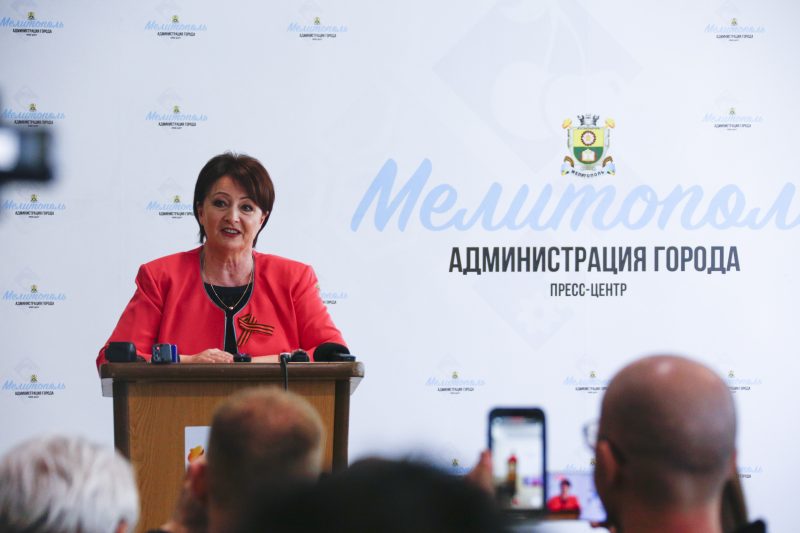
Interim Mayor of Melitopol, Galina Danilchenko.
“The Ukrainian forces have shelled our streets, even before the Russian forces arrived. I do not know why they shelled civilians. But they did it. It is the truth. Perhaps to blame it on the Russians later on.
I call out to the West. Do not send arms to Ukraine. Arms make peace difficult. The hope for peace will rise when you stop sending arms.
We used to be unable to celebrate May 9th Victory Day.They were shutting down the Eternal Flame (Monuments built in Soviet cities in memory of those who lost their lives in the war, with a flame that burns for an indefinite time), or they would not even let us commemorate in the war cemeteries. Both of my grandfathers have fought against the fascists in the WW2. We will not forget at what cost our grandfathers won this victory. They have tried to erase our history with the laws against communism. After the Euromaidan coup, they removed the orange-black ribbon, the symbol of the WW2, from the emblem of the city. But we have put it back again. We are also erecting the monuments removed by the Ukrainian government, back in their former places. We are committed to our traditions and our history.
The UK put me personally on the sanctions list. I neither have a property abroad, nor a bank account in Swiss banks. But these sanctions will harm Europe first.
There are some municipal clerks that left the city, wanting to return back now. The majority of the city population is satisfied with the situation today. The economic situation has seriously deteriorated after 2014. That was because Kiev’s foreign policies have ruined the economic relations with Russia, Belarus and Kazakhstan. Now, we will open the first Russian bank in the city. Kiev took away the money deposited in all the banks. Now we will switch to the Russian Ruble.”
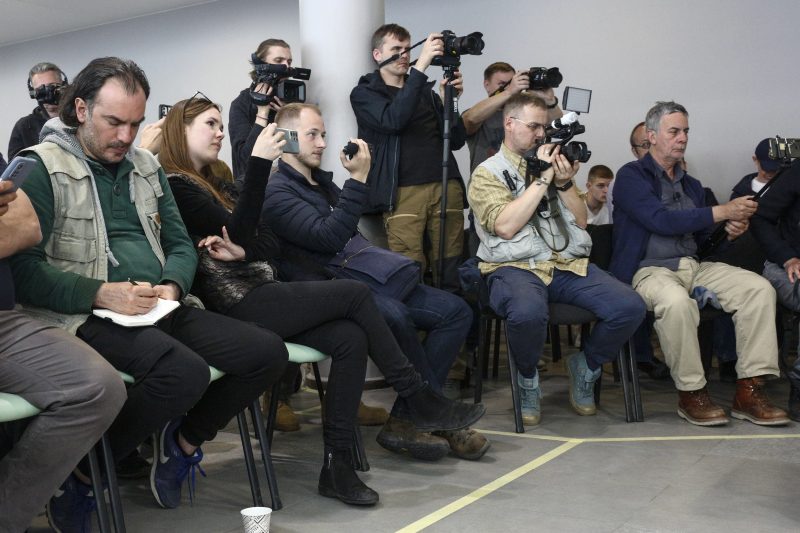
Mehmet Perincek and press members listening to Galina Danilchenko’s speech.
“Kiev is hindering the normalization process”
Stating that the future of the city will be decided by the people, but they will definitely not join Ukraine, Danilchenko points out that Kiev has never, ever cared about the lives of people in these regions. For example, mobile operators have stopped providing services in these regions, and people are even unable to call an ambulance. Danilchenko stresses that Kiev is doing everything possible it can to prevent the daily life from returning to normal. She gives some concrete examples of Kiev’s fake news and misinformation about the city.
The newborns are registered as a citizen of Melitopol
Mrs. Mayor highlights that the Russian Army and the Russian Air Defence Systems are currently protecting the city from airstrikes.
Kindergartens and schools are still open in the city. A total of 46 infants have been born recently. But since the previous administration took away all the seals and city records, the newborns cannot be registered as a Ukrainian citizen. For now, they are registered as citizens of Melitopol.
The Victory Banner is raised
After meeting with Danilchenko, we attend the flag ceremony in the city square. The Victory Banner is hoisted on the post. The Victory Banner is the flag that was raised on the roof of the Reichstag in Berlin on May 1st 1945. The banner had the name of the division that raised the flag in white letters along with a sickle-hammer, on a red background. This banner is now considered as the official symbol of the victory over the Nazi Germany in Russia. It is possible to see the copies of the flag everywhere throughout the zone of military operation.
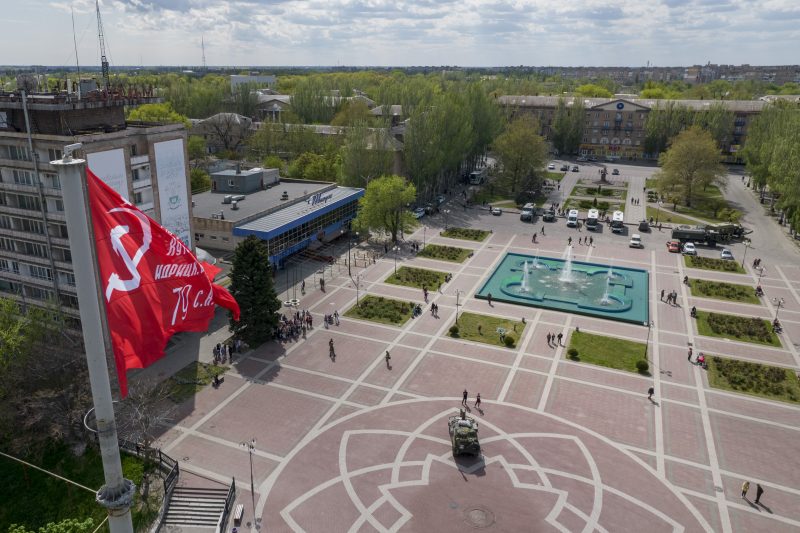
The song “Sacred War” written on the second day of the war
As the banner is being raised, the Red Army Anthem “The Sacred War” is played loudly from the loudspeakers. On July 24th, just two days after the Nazi Germany attacked the USSR on July 22nd 1941, the lyrics of the anthem were published in the newspapers Izvestia and Pravda. Immediately after that, the composer A. V. Alexandrov composed a hymn for the lyrics.
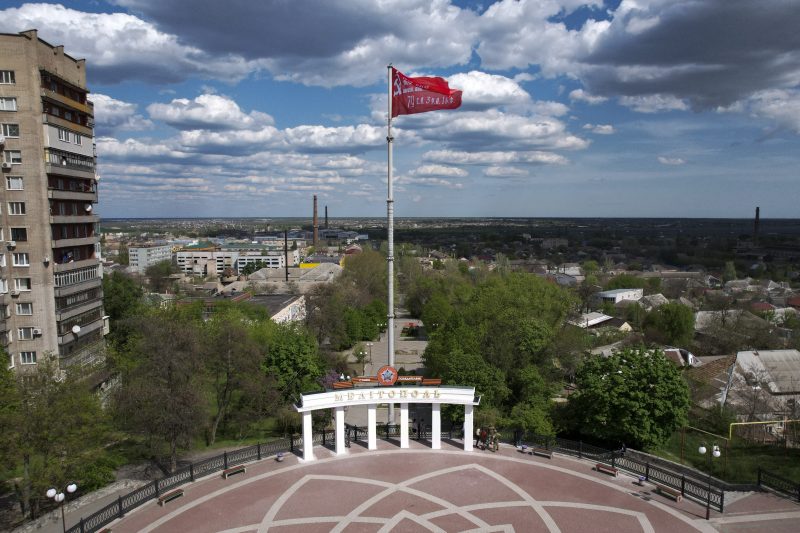
Since there was no time to print the lyrics and the composition on paper, Alexandrov writes them all down on a blackboard with a piece of chalk. Choir members and the musicians write the composition on their notebooks by hand. One day was given for the Choir to practice. The anthem was first performed on July 26th, at the Belorussky Railway Terminal in Moscow, when soldiers were sent to the front-lines. According to the memoirs of the witnesses, it was played live five times that day.
The anthem has become the official anthem of the War. The military parade held in Red Square on May 9th, is still being opened with this anthem.
Words from a war veteran
As the flag is being raised, I look around and see many people, young and old, unable to hold their tears. Then we go to the Colonel Vladimir Kapitonov, a retired aviator and a war veteran who gave the order to hoist the flag. Back in the war, he went all the way to Berlin, was wounded twice, and even put his signature on the wall of the Reichstag. He is now 98 years old.
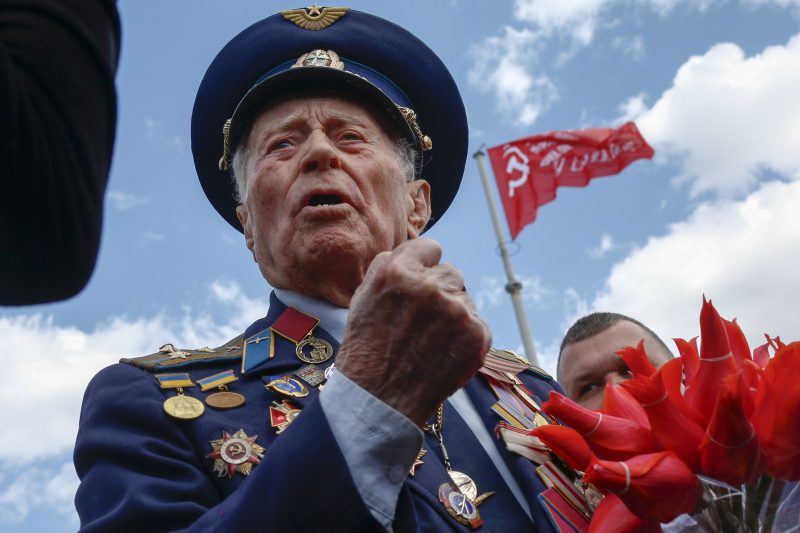
Today is the 1st of May. He says, “Labour is the most important value”, referring to the importance of the day. “All labor is honourable, no matter if you are the head of the state, a factory worker or a security officer”. He emphasises that fascism is the main enemy of all humanity and recounts his memories from Berlin: “We did not fight the German people, we fought against the fascism. Now we must keep living without any fascism.”
Townsfolk of Melitopol on the ice rink
We visit the new ice skating centre before we leave the city. There are people of all ages. Even one of the Russian officers takes off his boots and puts on the skates to join them.
The armed conflict is mostly over in the regions we are visiting, but a new war is beginning. That is, the reconstruction of everyday life, the revival of the economy… But the most important thing of all is to have a motherland under whose roof they freely and safely live. And these people will either choose or establish that homeland in the near future.
The corridor from Donetsk to Crimea
We are now moving to Crimea to return back to Russia. It’s very important here. With this military operation, Russia has now opened a corridor from Donetsk to all the way to Crimea. Transport and logistics are critical for the security and the economic integration of these regions. Our travel route crosses all over this corridor.
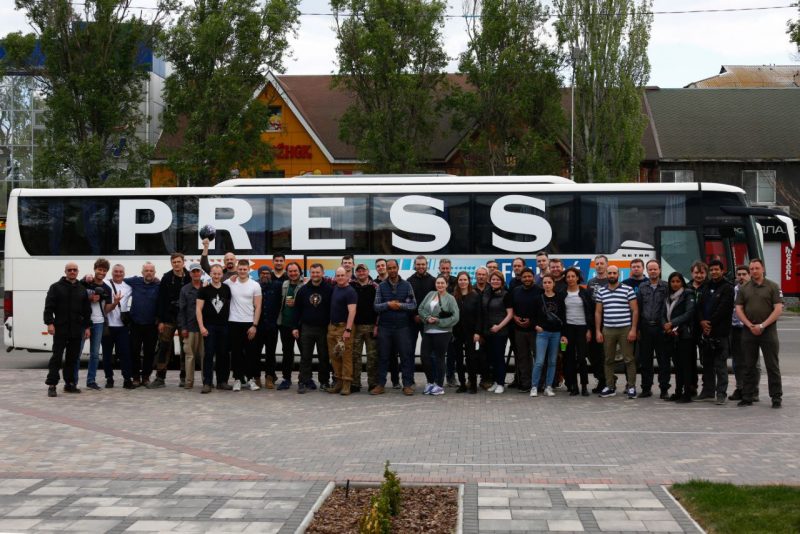
Group photo before leaving Melitopol
The first ‘Hero Medal’ is given to a Muslim from Dagestan
I am now making a good use of the last hours on the trip. I keep chatting with people on the bus. They say the losses were dire at the beginning, but then they became quite infrequent. And the recipient of the first Hero Medal in this operation, is a Muslim from Dagestan: Senior Lieutenant Nurmagomed Gadzhimagomedov. He was wounded during combat, surrounded by fighters from the Azov Battalion, and he detonated a hand grenade, ended the lives of the enemies around him, as well as his own. His parents stated that they were proud to raised such a son.
I also learn that 12 percent of the Russian Army is made up of Muslim personnel, as well as 2 percent Buddhist personnel.
“Odessa will be the second Mariupol”
As we approach the end of the trip, I now have a vision in my mind about how Russia’s operation will take course. Ukraine is now cut off from the coast of the Sea of Azov. Moscow has a similar goal for all the Black Sea. For this, cities of Nikolaev and Odessa must also be liberated. And there is no doubt that the operation will continue towards that direction.
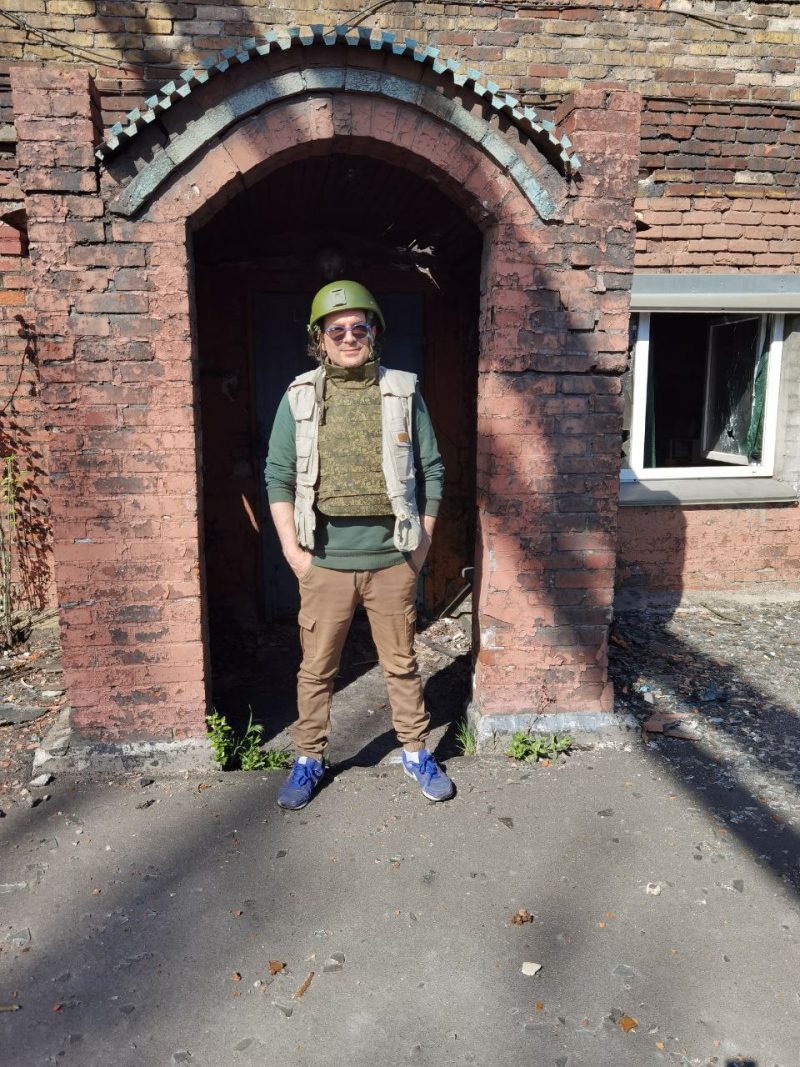
Mehmet Perincek at the Mariupol Port
In this respect, it becomes clear that Ukraine will be completely isolated from the gas deposits in the Black Sea and from many other subterranean resources, such as coal, in the east of the country.
So, I ask: “Where will the second Mariupol be?” Where will the fiercest clashes be expected next? They answer: “Odessa”, without even hesitating. They tell that Ukraine is making a massive stack-up in the city.
Kiev is also the next
I also wonder “Will there be a next?”. They say “There is also Kiev. We will continue until Ukraine is completely cleared of neo-Nazism and demilitarised.”
It can be seen that the determination and morale of the Russian Army seems to be high, in this three-day trip. Sooner or later, the aims of the operation, in their own words, will definitely be realised.
The second front that is attempted to be opened in Moldova
Meanwhile, the activities in Moldova and the Transnistria also draw my attention. The Russian Defence Ministry stated: “They want to open a second front against us in Moldova. Washington and Kiev want to draw us into a second conflict there. Their purpose is to divert our attention from Donbass, to prevent us from concentrating on Donbass and to divide our forces. They know very well that the liberation of Donbass will be their end. They are also staging terrorist acts inside Russia to distract our attention. We are putting an effort to prevent these as well.”
They say that there is also another aim in dragging Moldova into this war: “Ukraine has no significant airport left under its control. They wish to use the two international airports in Moldova for logistic.”
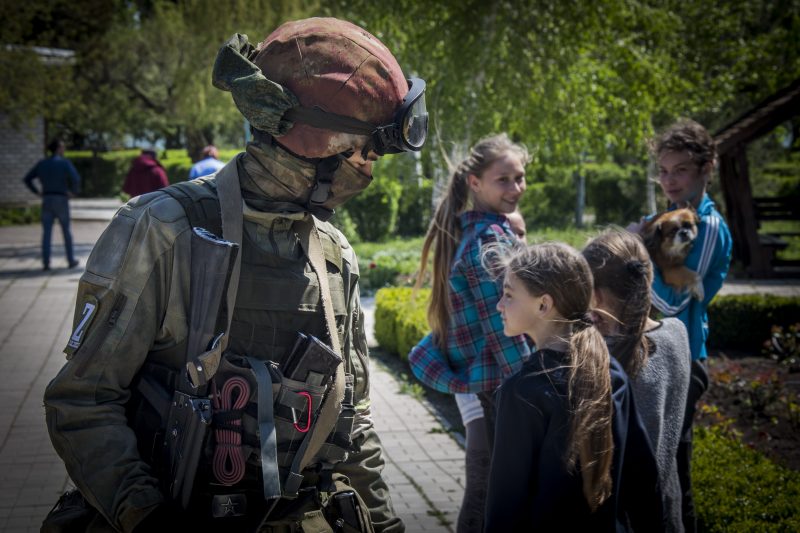
The camp in Berdiansk, where the civilians that fled Mariupol stay
“The Kiev Regime is all about filling their pockets”
According to the Russian military officials, the Kiev regime is also seeing its own end approaching. Yet none of them are concerned with Ukraine and its people. They have already sent their families abroad. They will also flee themselves. But until then, they are all about filling their own pockets. Then they added:
“Every nation is great. The Turks, the Russians, the Ukrainians, Americans… It is not right to see only one nation as supreme. But that is exactly what Washington and Kiev think and act like.”
Government alternatives in Ukraine
I also wonder “Are there alternatives to the current regime in Kiev?” Viktor Yanukovych has shown his incompetence back in 2014. He has failed to take a solid stance to maintain his constitutional powers and missed important opportunities in every single time. It seems that Yanukovych is not an option for Ukraine in Moscow’s opinion.
What about the opposition leader Viktor Medvedchuk, who was recently arrested by the Ukrainian authorities? He has not lost all its influence and power in Ukraine yet. And as we wrote in the first chapter, the supply sources of the Ukrainian forces in Azovstal are running low. They are expected to use up their last supplies in two weeks and eventually surrender. There are not only important Ukrainians inside, but also foreign individuals that whose capture will also make an international impact. It seems only then, exchange of some of them with Medvedchuk will be on the agenda.
North Crimean canal is now opened
We are now approaching Crimea. Russian fighter jets and helicopters are flying low above us. Some remnants from the beginning of the conflict are immediately visible on the Ukrainian side of the border. The checkpoints and the buildings on the border were completely razed.
There is this one last place in the program when we reach Crimea: the North Crimean Canal. The canal was closed by Kiev with embankments after the separation of Crimea from Ukraine. Crimea was left without water at that time. The water problem was later solved with a pipeline through Russia. They also demolished those embankments with the operation. Now, water flows to Crimea through this canal without any problems.
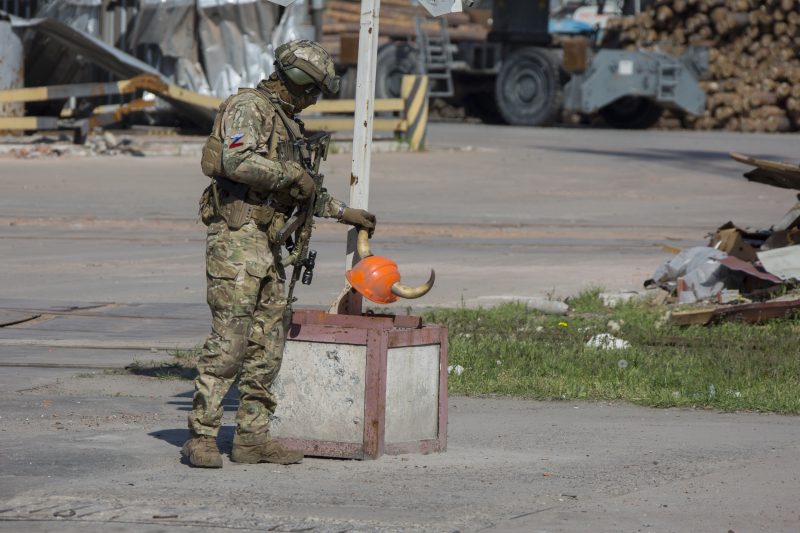
A Russian soldier at the Mariupol Port
Return to Moscow
Now I have to catch the train. This time, I’m content with just listening the story, rather than seeing it with my own eyes. I catch the Simferopol-Moscow train from Dzhankoi (Janko). As you already know, the airspace of both the Republic of Crimea and Rostov Oblast is closed to commercial air traffic. Therefore, the only way of transportation is by land.
After about 30 hours of train journey from Crimea, I arrive in Moscow.













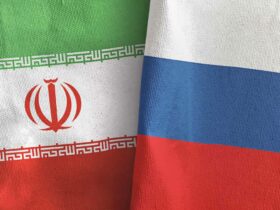
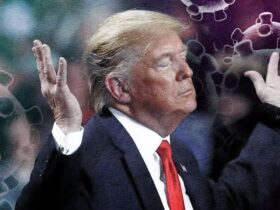
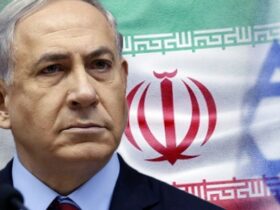

Leave a Reply